2003 Toyota Camry Service, Tires & Repairs
Get Started
Complete Auto Care for Your 2003 Toyota Camry
-
TIRES FOR YOUR 2003 Toyota Camry View Tire Info GET TIRE PRICING
-
REPAIR FOR YOUR 2003 Toyota Camry View Repair Info SCHEDULE REPAIR
-
MAINTENANCE FOR YOUR 2003 Toyota Camry View Maintenance Info SCHEDULE MAINTENANCE
-
OFFERS FOR YOUR 2003 Toyota Camry Limited Time Tire Offers VIEW ALL COUPONS
2003 Toyota Camry Tires
Recommended Tires | Tire Information
2003 Toyota Camry Tires Sizes, Speed Ratings, and Inflation
Not sure about your 2003 Toyota Camry tire size? Use the following chart to find information on tire size, speed rating, and inflation.
| Trim Level | Speed Rating | Inflation in PSI F/R | Tire Size |
|---|---|---|---|
| 2003 Toyota Camry LE* | H | 29 PSI/29 PSI | P205/65R15 |
| 2003 Toyota Camry LE* | T | 29 PSI/29 PSI | P205/65R15 |
| 2003 Toyota Camry SE | V | 29 PSI/29 PSI | P215/60R16 |
| 2003 Toyota Camry XLE | V | 29 PSI/29 PSI | P215/60R16 |
|
2003 Toyota Camry LE* Speed Rating: H Inflation F/R: 29 PSI/29 PSI |
|
2003 Toyota Camry LE* Speed Rating: T Inflation F/R: 29 PSI/29 PSI |
|
2003 Toyota Camry SE Speed Rating: V Inflation F/R: 29 PSI/29 PSI |
|
2003 Toyota Camry XLE Speed Rating: V Inflation F/R: 29 PSI/29 PSI |
* Note: these models have different tire sizes depending on vehicle options.
Recommended Tires for Your 2003 Toyota Camry
What tires are best for a 2003 Toyota Camry? Check out the following tire brands and types.
 Ecopia EP422 Plus
Ecopia EP422 Plus
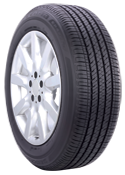
- Platinum Pact Limited Warranty
- All-Season
- Performance
 Blizzak WS90
Blizzak WS90
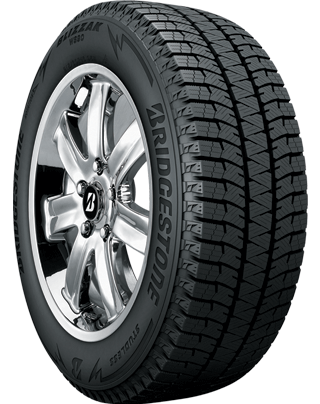
- No warranty
- Winter
- Winter
 Turanza QUIETTRACK
Turanza QUIETTRACK
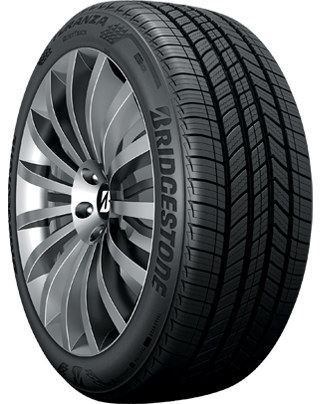
- No warranty
- All-Season
- Performance
 WEATHERPEAK
WEATHERPEAK
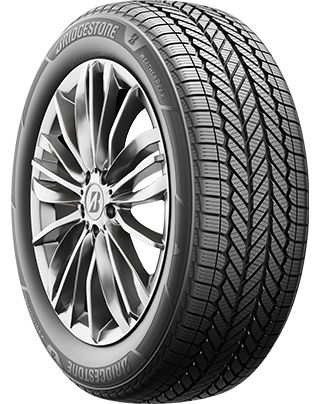
- Platinum Pact Limited Warranty
- All-Season
- Passenger Tires
 ALL SEASON
ALL SEASON

- No warranty
- All-Season
- Passenger Tires
 WEATHERGRIP
WEATHERGRIP
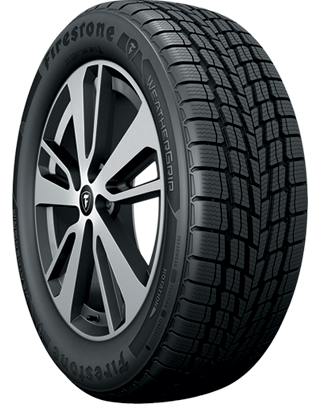
- No warranty
- All-Season
- Passenger Tires
 Winterforce 2
Winterforce 2
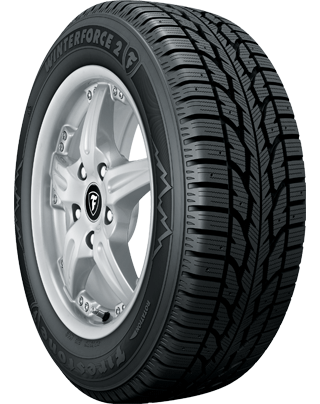
- No warranty
- Winter
- Winter

- No warranty
- All-Season
- Passenger Tires

- No warranty
- All-Season
- Passenger Tires
 Extensa A/S II
Extensa A/S II

- No warranty
- All-Season
- Passenger Tires
Choosing 2003 Toyota Camry Tires
Apart from finding the right tire size, there are a couple of other factors to consider when buying Toyota Camry tires like how and where you drive, and how much you want to spend. When thinking about your driving conditions, consider where you live (mountains vs. city vs. countryside) and the kind of weather can catch you off-guard. (Watch out Tornado Alley!) Drivers in states that fully experience all four seasons often buy two sets of tires: one set for winter, one set for summer. Other drivers prefer the convenience of all-season tires. They make one trip to the tire shop and they're pretty much ready for rain, light snow, or sun!
Next, consider your driving style. If you're an avid off-roader who yearns to pioneer new paths, you have very different tire needs than a highway commuter who doesn't hit the hills very often. Visit your local Firestone Complete Auto Care for help selecting the tire that's right for you, or get started by browsing tires that fit your Toyota Camry.
Installing Toyota Camry Tires
Firestone Complete Auto Care installs more tires on more cars than most other companies. We're your one-stop shop for tire installation, rotation, and ongoing maintenance! Buy 2003 Toyota Camry tires online and schedule your installation when it's convenient for you.
2003 Toyota Camry Tire Questions
-
Why check Toyota tire inflation? Even a tiny decrease in tire pressure could impact your safety and fuel economy. Maintaining proper tire pressure can help increase fuel economy, improve braking time, and boost tire lifespan.
-
What do the tire sidewall numbers mean for my Toyota Camry? The numbers on your tire sidewall give you information about tire speed rating, traction, treadwear, tire size, and load carrying capacity. Chat with a tire technician to learn how to read the numbers on your Toyota tires!
-
Can I check the tread depth on my Toyota tires at home? Stay on top of your tire tread depth to help avoid a dangerous drive. You can check tread depth with a penny. Hold the penny so that Abraham Lincoln is facing you, then place your penny into a tread groove upside down. If you can see the top of Abe’s head, your tread is shallow and it might be time for new Toyota Camry tires. Grab a penny. Hold the so that Abe Lincon's head is facing you and his hair is pointing toward the ground. Then, place the penny into a tread groove. If you can see the top of Abe’s head, your tread is shallow and it might be time for new Toyota Camry tires.
Repair Services for Your 2003 Toyota Camry
How do I learn more about auto repairs? Click on a service below to read about the types of Toyota Camry repairs we do at Firestone Complete Auto Care.
2003 Toyota Camry Repair Information
For most drivers, the words “car repair” don’t exactly spark excitement. But at Firestone Complete Auto Care, we strive to give you the excellent repair experience you deserve. When you come to us for 2003 Toyota Camry repair services, rest easy knowing that your Camry is in capable hands. We'll work to evaluate the scope of repairs needed and explain your options. If a repair isn't necessary, we won't recommend it.
What Will Toyota Camry Repairs Cost?
The cost to repair your 2003 Toyota Camry depends on which repairs are needed, the cost of any replacement parts, the labor involved, and where you live. And check back often — we update our deals regularly!
A few different aspects can influence repair costs for your 2003 Toyota Camry, like
2003 Toyota Camry Auto Repair Questions
-
Can scheduled maintenance help me avoid repairs? Don’t neglect scheduled maintenance. Sure, you could skip out on a few recommended maintenance services, but you may pay the price later. Bring your vehicle to Firestone Complete Auto Care at recommended service intervals to address minor issues before they get out of hand and keep your car running newer, longer.
-
Should I bring my Toyota in even if I can't pinpoint the problem? You know your vehicle. You also know when something feels 'off' with your vehicle. Pay attention when things don't run like they used to and stop by for a Courtesy Check when you notice an unusual sign, smell, or sensation. We might be able to help you prevent Toyota Camry repairs!
-
Why do you recommend certain repairs for my Toyota? We won’t recommend a service or repair for your 2003 Toyota Camry unless we think it’s necessary to keep you safe. Want to know more about a specific recommended repair? Ask! We’re here to help.
Get Your 2003 Toyota Camry Brakes Fixed
You might have a strong and reliable engine in your Toyota Camry. But if you can't stop it, then it's scrap metal. If you’re experiencing squeaky brakes or a loss of braking power, don’t wait! Unresponsive brakes make it tough to give the road your best. Plus, ignoring your brake problems can result in more damage and higher brake repair bills. Go to your local Firestone Complete Auto Care for 2003 Toyota Camry brake repairs. We offer a variety of brake services like pad/shoe replacement, brake rotor/drum refinishing, brake fluid exchange/bleeding, and brake caliper and wheel cylinder service.
Toyota Camry Brakes Frequently Asked Questions
-
Why does my Camry shake when I brake? Your Camry could shake when you brake due to worn brake pads or rotors, warped rotors, loose or worn suspension components, or faulty brake calipers. You can always schedule a free brake inspection at the first sign of strange brake behavior.
-
What is the average lifespan of Camry brake pads? Brake pads generally last between 30,000 and 40,000 miles. Your driving can affect how long your Camry brake pads last, though. For example, mainly driving on highways and gradually braking can help increase the lifespan of your brake pads, and carrying hefty loads or riding your brakes can shorten it.
-
Is it bad if my Camry is leaking brake fluid when off? Your Camry brake system is a closed hydraulic system, so a brake fluid leak likely means you have an issue in your brake system. Over time, brake components can wear out or get damaged, causing a brake fluid leak.
Repairing Your Toyota Camry Drivetrain
You don't want to go to just anyone for drivetrain repair. Drivetrains for front, rear, and all-wheel-drive and 4WD vehicles are all different. You want to go to Firestone Complete Auto Care. We can help repair all of your 2003 Toyota Camry drivetrain components Your Toyota Camry may need driveshaft attention if you feel vibration as your vehicle accelerates, clunks when shifting, heavy vibrations in your floorboards, or resistance when turning.
2003 Toyota Camry Drivetrain Q&A
-
What are the symptoms of a damaged Toyota drivetrain system? Hear noises toward the back of your Toyota Camry? See fluid leaking? Having issues turning? These could all be signs of drivetrain damage you don't want to ignore. Take action quickly to catch repairs or replacements before something more severe happens.
-
Why is the malfunction indicator light (MIL) on in my Camry? Engine problems, transmission problems, faulty sensors, electrical issues, misfire issues, and connector problems could all cause your Camry’s malfunction warning light, or better known as the check engine light, to illuminate.
-
How worried should I be about a drivetrain malfunction in my Camry? If your Camry has a drivetrain malfunction, don't wait. Get it checked out by a professional mechanic. Identifying the underlying cause and performing the appropriate repairs right away can help prevent further damage and avoid unsafe driving conditions.
Wheel Alignment for 2003 Toyota Camry
An alignment involves making adjustments to your Toyota Camry's suspension system, which serves to attach your wheels to your vehicle. During the service, calculated changes are made to the angles of your tires. This is so that your tires hit the road at an optimal angle for your vehicle’s performance — just as Toyota intended. Before we adjust the alignment of your 2003 Toyota Camry, we’ll start by checking the current alignment angles. Then, we’ll adjust the angles as needed until they match recommended measurements from Toyota.
Questions About Toyota Camry Alignment
-
Are there road conditions that can hurt my Toyota Camry alignment? Hitting a pothole or curb can alter your wheel alignment. So can general wear and tear over time.
-
How often does your Camry need a wheel alignment? Check your Camry owner's manual for Toyota's recommended interval. It's generally a good idea to check your alignment every 6,000 miles or 6 months, depending on which comes first.
-
Do you need to get your Camry wheels aligned when you get new tires? It’s likely not a requirement to get an alignment when you install new tires on your Camry, but it's a smart idea to do so anyway. An alignment can help ensure even tire wear, smooth handling, and better fuel efficiency.
Engine Repairs for Your 2003 Toyota Camry
When your Toyota Camry engine needs repairs, our technicians will provide you with a thorough explanation beforehand. We make recommendations, but you make the final decision. If a service can wait, we’ll make sure you know. We'll also tell you if it's necessary for your safety. We seek to give you all the info you need to make a smart decision about our services. Choose Firestone Complete Auto Care for Toyota Camry engine repairs and you can drive easy knowing that we use Toyota-approved parts and fluids — timing belt, oil gasket, ignition coil, or another part.
Engine Q&A 2003 Toyota Camry
-
Why does the check engine light come on when I start my Camry? Generally, your check engine light turning on upon ignition is not a bad thing. It’s just your Camry firing up its circuits. The light should turn off in a bit, but come see us if it doesn't.
-
Why does my Toyota engine sound different? Strange under-the-hood noises can point to problems within your Toyota Camry engine. Tapping or knocking could mean you need an oil change. Whistling sounds could mean you have an intake leak or misaligned belt. Squealing may be caused by a loose fan belt, and grinding could be a sign that something is wrong with your brakes — not the engine.
-
Are you unknowingly damaging your Toyota Camry engine? Certain driving habits can damage your engine and should be avoided. These habits include 'running on fumes,' revving the engine while still in Park, or pushing 'the pedal to the metal' before the engine has warmed up. Help sustain your engine’s performance and efficiency by staying miles away from these bad driving practices.
Tire Repair for Your 2003 Toyota Camry
Firestone Complete Auto Care is here for you when your 2003 Toyota Camry needs flat tire repair or inspection. Our tire technicians can determine whether it's safe to plug and patch the tire, or whether it needs to be replaced. To start, we’ll consider the location of tire damage, the type of issue, the size and scope of the damage, and the amount of wear on your tires.
If your 2003 Toyota Camry tire puncture can be repaired, the repair process is actually fairly simple: (1) Take the tire off the wheel for easy inspection, (2) fill the puncture to keep the moisture out, and (3) secure and seal the inner tire liner to ensure the tire is airtight.
Your Questions About Toyota Camry Tire Repair, Answered
-
Can I drive my Toyota on a flat tire? A flat tire that’s not addressed can take a terrible toll on the rest of your car. Until you have it repaired or replaced, drive your Camry as little as possible to reduce your risk of damage to the wheels and alignment – or further damage to that already struggling tire!
-
Is temporary sealant bad for my Toyota's tires? Fast fixes are a mixed blessing. They’ll help you get your Toyota Camry to Firestone Complete Auto Care, but don’t count on them to keep you on the road for very long. Using a temporary sealant may also void a Bridgestone or Firestone tire warranty.
-
Why do the tires on my Camry keep losing air? Tire punctures, damaged wheels, and leaking valve stems are possible reasons for your Camry tires continuously losing air.
2003 Toyota Camry Maintenance
You want your Toyota Camry to last as long as possible. If you put in the effort to keep up with proper maintenance, you could hit 200,000 miles (or beyond!) in your Camry.
2003 Toyota Camry Maintenance Information
There's no need to guess when it's time to get Camry maintenance, and no need to wait until something goes wrong. Just follow your 2003 Toyota Camry maintenance schedule! The recommended maintenance schedule is put together by Toyota, your vehicle manufacturer. Scheduled maintenance services can vary depending on driving conditions, climate, and other factors; however, there’s a good chance that your vehicle’s recommended maintenance services will include fluid exchanges, filter changes, new brake pads, oil changes, and tire rotations. Staying on track with routine service appointments can help your Camry perform better, keep you safer on the road, and prevent common 2003 Toyota Camry problems.
Overview of Essential Toyota Camry Maintenance Needs
Bring your 2003 Toyota Camry to Firestone Complete Auto Care for factory-recommended maintenance services and a skilled technician will start the appointment with a Courtesy Check. A Courtesy Check helps "set the stage" for your service and catch any small problems before they turn into big repairs. Every Courtesy Check will include a visual inspection of your Camry. We’ll check your head and tail lights, fluid levels, filters, tires (and their alignment!), and windshield wiper blades. We’ll also perform a free battery check to determine your battery’s charge level.
Firestone Complete Auto Care is the place to go for 2003 Toyota Camry maintenance. Don’t wait until something goes wrong with your car. Visit your nearest location for proactive maintenance today.
Questions About 2003 Toyota Camry Maintenance
-
What should I do after hitting a pothole in my Toyota Camry? Check your car for pothole damage! If you’ve recently hit a pothole (or even if you don’t remember hitting one… they can be sneaky!) check your tire treads, tire sidewalls, and wheels for damage. Potholes can also knock your car out of alignment, so have your alignment checked if you suspect you’ve driven over a rough patch of road lately.
-
When should I switch my Toyota Camry to high mileage oil? Do you have more than 75,000 miles on your Toyota Camry? If so, request to switch to high mileage oil at your next oil change. This type of oil is specially formulated to keep aging engine parts in the best possible condition.
-
Can Toyota dashboard warning lights wait? Because there might be a problem under the hood. Those warning lights are there for a reason! As soon as you notice that one’s illuminated, take your Toyota Camry to Firestone Complete Auto Care so you can address any small problems long before they worsen.
Battery Size & Replacement for 2003 Toyota Camry
Not sure what battery to get for your Toyota Camry?
| Battery | Engine | Warranty | Cold Cranking Amps | |
|---|---|---|---|---|
| 35-1 | L4/2.4L | Replacement 24 months | Performance months | 500 |
| 35-2 | L4/2.4L | Replacement 36 months | Performance months | 640 |
| 24F-RP | L4/2.4L | Replacement 48 months | Performance months | 750 |
| 24F-3 | V6/3.0L | Replacement 24 months | Performance months | 650 |
| 35-2 | V6/3.0L | Replacement 36 months | Performance months | 640 |
| 24F-RP | V6/3.0L | Replacement 48 months | Performance months | 750 |
2003 Toyota Camry Car Batteries
On average, auto batteries last anywhere from three to five years. Don’t get stranded by your Camry’s car battery. Replace it regularly instead! Pay attention to clues that your battery is on its way out. A lagging starter, an illuminated check engine light or battery signal, bloated battery case, corroded battery posts, or dim headlights may all indicate that your battery is on its last leg.
You can also get a Free Battery Test at your local Firestone Complete Auto Care. Drop in for a free battery check and, if necessary, a battery replacement to help keep your 2003 Toyota Camry running! Automotive batteries are just one of our many areas of expertise. Our technicians are familiar with Toyota-specific recommendations for Camry battery cold cranking amps and reserve capacity. Get help identifying the type and size of battery that matches your vehicle, and schedule a weekday or weekend battery replacement service for your car.
Answers to Your Toyota Camry Car Battery Questions
-
Why won’t my Toyota Camry battery hold a charge? A car battery that needs to be jump-started every time is as good as dead. It may be getting old. Or, you’ve been leaving the doors slightly open and the dome lights on during the night. Stop in for a free battery check at your nearest Firestone Complete Auto Care and learn more about your battery's charge.
-
What is the average lifespan of a car battery? A car battery normally lasts three to five years, but this number can vary based on battery type, your driving habits, and battery maintenance.
-
Why is there white, flaky stuff around my Camry’s battery post? A chemical reaction between battery acid and the air can cause a white, crusty buildup to form on the terminals of your Camry car battery. This buildup — known as corrosion — can impede the flow of electricity and cause a range of issues, from poor performance to premature battery failure.
Oil Changes for 2003 Toyota Camry
Toyota recommends changing your 2003 Camry’s oil at regular intervals. Outside of Toyota-recommended oil change intervals, your Camry may need an oil change if your check engine light is on, you hear engine knocking, smell oil inside the car, or notice excess vehicle exhaust. You may also need an oil change more frequently than Toyota recommends if you haul heavy loads, frequent dusty roads, go off-roading a lot, or drive at low speeds for long distances.
Whether it’s synthetic, conventional, or a blend of both — your local Firestone Complete Auto Care has the right oil for your Toyota Camry. Talk with a teammate and consult your owner's manual before picking a motor oil. At Firestone Complete Auto Care, you can choose from the following oils: Quaker State® Advanced Durability™ conventional oil, Pennzoil® High Mileage Vehicle® motor oil, Pennzoil Platinum® Full Synthetic motor oil with PurePlus™ Technology, and Shell Rotella® heavy-duty engine oil. In an oil change service, an auto technician will change your Camry’s oil, replace and recycle your used oil and oil filter, check all of your other filters, top-off important fluids, and perform a free inspection on the rest of your vehicle. Make an appointment for an oil change service today and let the oil experts take care of your Camry's engine.
Oil Change Q&A for Your 2003 Toyota Camry
-
Why is my Toyota Camry oil light illuminated? If you’re overdue for an oil change, it might trigger your Toyota Camry oil change reminder light. If the oil pressure light is illuminated, it could be due to low engine oil, a failing oil pump, a malfunctioning oil pressure sensor, or a clogged oil filter.
-
Can I change my Toyota Camry oil at home? Changing your own oil isn't as convenient as you might think. It requires special tools and old oil must be disposed of properly. Having your oil professionally changed reduces the chances of something going wrong with the oil change, but also with your vehicle down the road.
-
Why is my Toyota Camry exhaust smoke grayish or blue? You could have an oil leak and have a case of burning oil. Looks like it’s time for a professional to take a look. The leak could be the result of worn valve seals, fried piston rings, or old cylinder walls.
Engine Tune-Up Service for Your 2003 Toyota Camry
Regular engine tune-ups can optimize your Camry’s power on the road. Your nearest Firestone Complete Auto Care location has several options to choose from when it comes to Toyota Camry engine tune-up services. The first is the standard Firestone Tune-Up. It includes a complete visual inspection of engine components, installation of new spark plugs, and a lifetime warranty on parts*. Another service option pays special attention to the filters in your Camry. Specifically, we replace the fuel filter and air filter. The third tune-up option is a fuel system cleaning service, which is a three-step process that removes varnish, dirt, and carbon deposits on your Camry's fuel injectors, throttle body, and throttle plate. This goes a long way in boosting your fuel system’s overall performance. Consider this when choosing a tune-up service for your Camry: your vehicle’s maintenance record and mileage can determine which service is best. Ask one of our technicians what your vehicle needs, based on your driving habits and your car’s current condition.
*Ask a Firestone Complete Auto Care teammate about full terms and conditions for warranties.
Common Engine Tune-Up Q&A for 2003 Toyota Camry
-
Will it hurt my Toyota Camry to drive with old spark plugs? Replace spark plugs on time or about every 30,000 miles or so. Spark plugs are small but mighty. The spark of electricity that the plug emits across a small gap creates the ignition for the combustion needed to start your car. Without that spark, your car won't start.
-
What does a puddle underneath my Toyota Camry mean? Puddles could indicate that your vehicle is leaking coolant, oil, or brake fluid. Ignoring these leaks can lead to permanent engine damage, so address these symptoms ASAP with a tune-up service.
-
How often do Toyota Camry fuel injectors need to be cleaned? The frequency at which car fuel injectors should be cleaned can vary depending on several factors, including the type of fuel used and the driving conditions. Some manufacturers generally recommend a fuel system cleaning as part of your general car maintenance, or as needed based on symptoms of poor fuel system performance.
Suspension Service & Repair for 2003 Toyota Camry
During the first few years you had your 2003 Toyota Camry, the ride was probably so smooth that you didn’t even think about it! Lately, though, your ride’s been feeling a little bumpy. Maybe your Camry jolts, drifts to one side, or makes an unusual noise when going over a speed bump. As soon as you notice that something’s “off” with your 2003 Toyota Camry, bring it in for steering and suspension services. We'll get to the root of the problem and, if your Camry suspension system needs repair, we’ll go over the services you need and how much they will cost before we do any work.
2003 Toyota Camry Steering & Suspension Questions
-
Why is my Toyota Camry bouncing excessively? If your shocks or struts are in bad shape, they can’t dampen road bumps like they should. This can cause your Camry to bounce more than usual.
-
Why does my Camry tilt forward when I hit the brakes? As you brake, the forward momentum of your Camry combined with its weight sends a ton of force to its front end. A damaged or worn suspension system can cause the front end to compress and dip even further.
-
Does tire pressure and tread depth impact my Toyota's suspension? Keeping your tires properly inflated can help reduce strain on the suspension, and also help you notice when you need new tires. A tire that doesn't have an adequate amount of tread can't grip the road or function as well as the manufacturer intended.
Convenient & Local 2003 Toyota Camry A/C Service
Our trained technicians will do what they can to solve your 2003 Toyota Camry A/C problems. During an A/C performance check, we'll determine the condition of your 2003 Toyota Camry A/C system to determine whether repair work is needed. This check will include an examination of system pressure, a visual inspection, and a leak test.
Let's say we repair your 2003 Toyota Camry A/C system. We will also perform an A/C evacuation and recharge. During this process, a technician will remove the old refrigerant from the A/C system. Then, they’ll perform an evacuation (also known as a discharge) on the entire system per Toyota guidelines. Finally, we’ll recharge the A/C system with new refrigerant.
Questions About 2003 Toyota Camry A/C Systems
-
What’s making my Camry A/C put out warm air? If your car’s air conditioning isn’t blowing cold air at all (or it tries, then turns warm), you could have a clogged expansion valve, a faulty compressor clutch, a leak, or a malfunctioning fuse in the system.
-
What causes A/C system leaks? Over the years, the rubber seals and gaskets in your Camry’s A/C system naturally degrade. Moisture can get into the system and cause a malfunction, or parts can simply wear out so that your system no longer seals properly.
-
Why does my vehicle have to be moving for my Camry’s A/C to work? If your A/C only works when the vehicle is moving, there could be a problem with part of your Camry’s A/C or electrical system. Potential issues include low coolant or a faulty cooling fan.
Transmission Services for 2003 Toyota Camry
The transmission delivers power from the motor to your wheels so that you can drive at your desired speed. Since the transmission has to translate the precise amount of power for your desired amount of speed, a small transmission issue can put a big dent in your Camry’s performance. Toyota Camry transmission problems can present themselves as shifting delays, grinding or jumping during acceleration, a feeling of shakiness, or a burning smell or whistling sounds coming from under the hood. If you don’t pay attention to Toyota Camry transmission trouble you could see your fuel economy decrease or discover that your Camry’s not even driveable. Our technicians know how to service your 2003 Camry up to Toyota-recommended standards. Schedule an appointment at your local Firestone Complete Auto Care at the first sign of transmission problems to help keep your Toyota running for miles and miles.
Questions About 2003 Toyota Camry’s Transmission
-
When should I have my Camry's transmission fluid checked or exchanged? Caring for your Toyota Camry’s transmission fluid is a great way to help it perform. About every 30,000 to 60,000 miles is a good timeframe for having your transmission fluid inspected and perhaps changed. Service intervals can vary depending on how you use your Toyota, so check with your technician first. Luckily, leaks and low fluid levels are easy to spot and inexpensive to fix.
-
Can transmission fluid leak from my Toyota Camry? Yes. Toyota Camry transmission fluid can leak over time and potentially cause transmission issues. Worn or damaged seals, a loose or damaged transmission pan, a cracked transmission housing, faulty transmission cooler lines, or an overfilled transmission could cause transmission fluid leaks.
-
Can I drive my Toyota Camry with a transmission fluid leak? You should avoid driving with a transmission fluid leak. Your transmission system relies on transmission fluid to operate properly, and a leak may decrease performance, cause your Camry to overheat, or even lead to transmission failure.
Get a 2003 Toyota Camry Vehicle Inspection
When you bring your vehicle to Firestone Complete Auto Care for any service, we’ll automatically do a multi-point Courtesy Check. To start, one of our technicians will check the battery in your Toyota Camry to determine how much charge remains. We’ll follow the battery inspection with a visual check of your Toyota Camry’s filters, lights, wiper blades, fluid levels, belts, hoses, tires, and alignment.
Every service performed at your nearest Firestone Complete Auto Care will include a Courtesy Check, but you can also request a Complete Vehicle Inspection for your 2003 Toyota Camry if you suspect there may be a bigger problem. In addition to a visual check of everything that's included in a Courtesy Check, a Complete Vehicle Inspection also includes a hands-on examination of your steering, suspension, brakes, and exhaust system. The goal of this type of inspection is to unearth significant issues that might need immediate attention in order to prevent further damage.
Depending on where you live, you may be able to take care of your state inspection or safety test at your local Firestone Complete Auto Care. These inspections are governed by state automotive laws and may vary in different locations.
2003 Toyota Camry Vehicle Inspection Q and A
-
When does my Toyota Camry need an inspection? You drive your car, day in and day out, so you know it best. If you notice unusual engine noises or you can’t shake the feeling that something is 'off,' start with a Courtesy Check to stay ahead of potential issues.
-
Can you fix my 2003 Toyota Camry so it will pass a state inspection test? There's a good chance we can. Stop by for a full system inspection and we'll get to the root of the issue.
-
When is the best time to get a complete vehicle inspection for my Toyota Camry? The best time to have a complete vehicle inspection done on your Toyota Camry is when you notice something is off but you can’t locate the issue yourself. Schedule an inspection if you experience any unusual symptoms, such as unfamiliar dashboard indicators, strange engine noises, or steering changes. An inspection can be especially beneficial before a road trip for the simple peace of mind. You can feel confident in your adventure!
Radiator Service & Repair for 2003 Toyota Camry
Staying on top of routine radiator maintenance for your 2003 Toyota Camry is a huge factor in the longevity of your engine. In fact, Toyota recommends replacing coolant/antifreeze at specific intervals, but it’s a good idea to keep your eyes open for any indication that your radiator is failing. You might be driving around (or about to be stranded) with a failing radiator if you notice a low coolant light or higher-than-normal engine temperatures on your dashboard, or if you spot coolant leaks coming from your car.
If you bring your vehicle to Firestone Complete Auto Care, we start with a comprehensive inspection of your Toyota Camry’s cooling system. Then, we’ll move on to a machine-powered coolant exchange. Finally, we’ll refill the flushed sealants, lubricants and chemicals, then do a pressure check to catch any possible leaks. From the radiator cap to the heater core, we’ll take excellent care of your 2003 Toyota Camry at Firestone Complete Auto Care.
Common Toyota Camry Radiator Questions
-
What does the coolant light on my Toyota dashboard mean? Pay attention to the temperature gauge and lights on your dashboard. If a low coolant warning light comes on or your dashboard temperature gauge keeps rising, it’s likely that your engine is about to overheat (and could leave you stranded on the road). Wait for the engine to cool down, then have your coolant system checked immediately at your nearest Firestone Complete Auto Care.
-
What can cause my Camry to overheat? Your Toyota Camry engine could overheat due to low coolant, a clogged radiator, a damaged water pump, a malfunctioning cooling fan, or a faulty thermostat.
-
My Camry radiator sounds like it's rumbling or boiling! What's up? If your radiator sounds like it's boiling or rumbling, you could have air pockets in the cooling system of your Camry. You might also have a damaged radiator cap (super easy to fix!) or a clogged radiator.